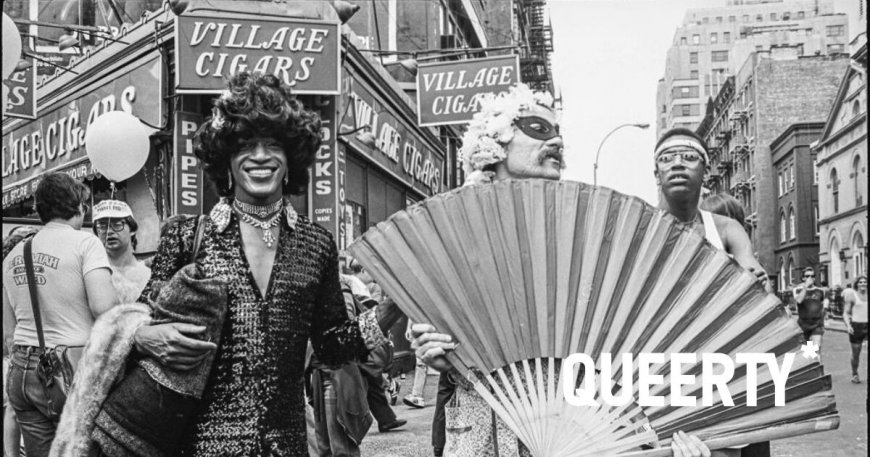What was Marsha P. Johnson really like? And is Stonewall Inn turning straight?
Gary LeGault offers an intimate look at Marsha P. Johnson, the Stonewall Inn's queer factor nosedives, and Brandon Fraser's Oscar-nominated performance in 'The Whale.'


Late queer activist Marsha P. Johnson has become immortalized for her iconoclasm and style, but it seems that only a few surviving insiders can describe what Marsha was actually like on an intimate level. Well, in a book called Transfigures — and a new play — author Gary LeGault does just that.
LeGault says Johnson was religious and polite and hardly ever drank or cursed. He remembers letting Marsha stay over in his apartment when she needed a place and says she was always respectful and let herself out in the morning, conscientiously locking the door behind her as she left. When Johnson hit the bars, she would only have one beer and then go back to Christopher Street, where she panhandled. (She was also a sex worker and performer.) Marsha was happy that Andy Warhol did a portrait of her, but she was less entranced by his world than by artistry that appealed to her personal taste. She loved jazz divas Billie Holiday and Dinah Washington and the camp film What Ever Happened To Baby Jane?
Related: 32 of the best LGBTQ+ books to read yourself or gift others
Johnson had a younger boyfriend named Joseph, and they enjoyed going out and causing a stir, though Joseph couldn’t seem to understand why they couldn’t be accepted as an ordinary couple by society. Her demeanor was clearly mysterious to some while utterly engaging to others. Writes LeGault, “Marsha would speak in a faraway, otherworldly voice, as if she were not quite within the moment, then suddenly snap back into the situation with complete recognition.”
Johnson grappled with mental health issues and would sometimes press a lit cigarette into her upper thigh, aware that it wasn’t exactly healthy behavior. What’s more, she always felt pain when she walked, since a cab driver had shot her in the butt when she ran out of the vehicle (no doubt to avoid paying), and the bullet was too close to the spine to be removed by surgeons. So they just left it there!
Another late drag icon, Warhol superstar Holly Woodlawn, is quoted in LeGault’s book as saying, “Marsha and I threw beer cans at the police together during the Stonewall riot. But at that time, no one thought of her as anything but a street person.”
She became increasingly iconic to the queer community, but LeGault claims that Johnson was a little fed up with living toward the end of her life. Her remains were found in the Hudson River in 1992, and LeGault doesn’t know if that was the result of suicide or murder (though other key people are convinced it couldn’t have been suicide). “But one thing is certain,” says LeGault. “Marsha was weary. Marsha was in pain.”
LeGault’s related play with music, Joseph and Marsha, is playing at Theater for the New City in New York City’s East Village through February 12. It’s a lovely, heartfelt and knowing musical, with a letter perfect Bryce Payne as Marsha; in fact, the entire cast is terrific. LeGault describes it as “a strange cross between Oliver! and West Side Story.” I guess that makes sense since those shows brought us “Where is Love?” and “There’s a place for us…”
Getting stoned at Stonewall

The aforementioned Stonewall Inn has been through a significant change, according to actor/singer Tym Moss. As Moss just told me, “The main floor is practically all straight now because the landmarked place has gotten more and more publicity. The heterosexuals have heard about it, and they basically want to come and observe the gays. One night not long ago, I was there with a guy I’ve been dating, and we were talking and making out. This straight woman was excited to see us because we were among the few gays there. She came up to me and said, ‘Hi! I have a shot for you!’ and she sweetly handed me a glass of booze. It was like feeding the animals at the zoo,” he added, erupting into raucous laughter. Amazing. When word of this gets out, the gays might return to Stonewall.
Putting the “thesis” back in prosthesis

I’ll gladly pour champagne for Oscar front-runner Brendan Fraser, who gives a beautiful performance in The Whale as a plus-sized bisexual writing teacher who seems to be eating himself to death but who wants to make amends with his estranged daughter before he goes. Fraser brings tremendous empathy to the character, a truth seeker who has made some missteps but has also been served hard luck and is desperate to ignite positivity in his final moments.
At a reception for the film at the Roxy Hotel, I asked Fraser if he’s gotten a good response from the queer community, and he said yes, people have been supportive because the film tells a meaningful story. When I asked about the “fat suit” he wears, the actor wisely responded, “You’ll never hear me refer to the costume that way.” He said his appearance in the film is thanks to prosthetic makeup designer Adrien Morot, who also happens to be the animatronic character designer for M3GAN. The man’s clearly a genius! So is Fraser, but when I asked what else he’s working on, he laughed and said, “Looking for a job, I guess.” But naturally, he’s Cliff Steele on Doom Patrol, and he will also be working the room on Oscar night.

 Mark
Mark 






